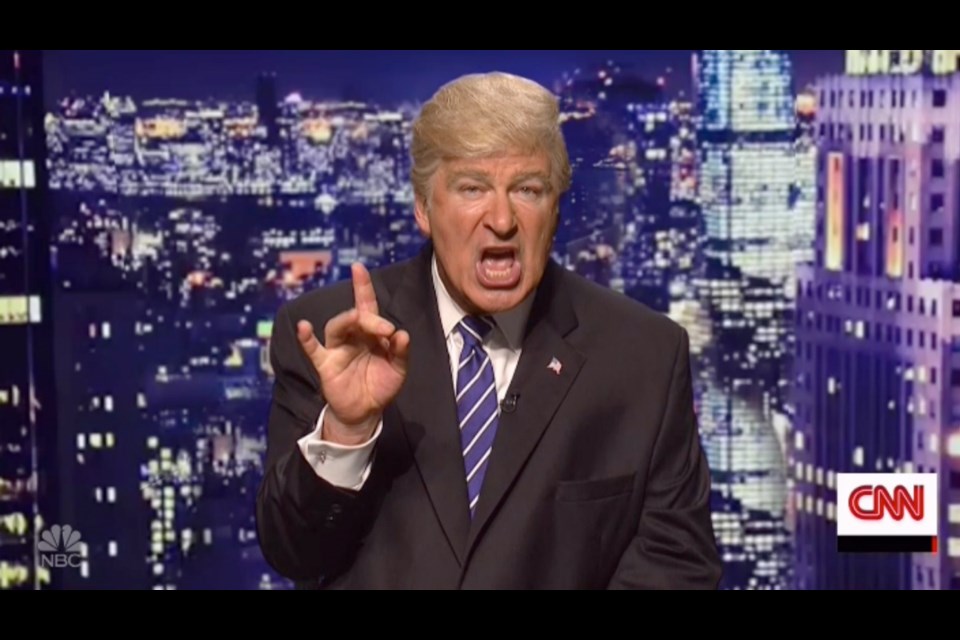Nevertheless
By Alec Baldwin
Harper, 288 pp., $35.99
If you happen to like Alec Baldwin, why do you like him? There are plenty of reasons. Baldwin came up with that jolly, fantastic line reading in Martin Scorsese’s The Departed — “Patriot Act! I love it I love it I LOVE it!” — and that alone is enough for me.
For many admirers of his work, it starts and ends with Baldwin’s uniquely commanding, medium-grade-sandpaper voice, conveying a hint of authoritarian bastard. Certainly he has played his share of such intimidating men. And on 30 Rock, where Baldwin soared for seven seasons as Tina Fey’s exquisite foil, the network kingpin Jack Donaghy, he reminded everybody how funny he was. As Donaghy, he killed, reliably, treading a fine line between deadly understatement and blithe disengagement regarding the petty problems of mere mortals.
In his ruminative new memoir Nevertheless, Baldwin reveals bits and pieces of a life and career full of switchbacks, some handled more wisely than others. The forlorn, faraway look in Baldwin’s eyes on the book cover suggests a personality with a lot on his mind. The actor, New York Philharmonic orchestra announcer, radio and television personality and combustible activist, “addicted to solitude” by age nine, might be 30-plus years sober, but some addictions are tougher to shake than the chemical ones.
This is Baldwin’s second book. The first, A Promise to Ourselves: A Journey Through Fatherhood and Divorce, came out in 2008. It ground through the many years of Baldwin’s wearying custody travails regarding the now-adult daughter Baldwin shares, uneasily, with his ex-wife, Kim Basinger. Aspects of that legal battle royal come up for further review in Nevertheless, which takes its title from an old, raunchy theatre joke. But mostly the leading man concerns himself here with a tricky childhood and his years as a performer on the rise.
The first half of Nevertheless is swift, eloquent, witty; the later chapters are more diffuse and tend to get caught up in grocery-listing the remaining stops along Baldwin’s resumé, as well as his tangles with various agents, managers and publicists. Nevertheless, I’m glad I read it; the good stuff in it is very good.
“Six kids and no help” is how Baldwin describes his mother’s existence, as young Alexander (who went by Xander) and his five siblings grew up in Massapequa, New York. His father died young, at 53, in 1983. “When she struck you,” Baldwin writes early on in Nevertheless, “her right arm sprang toward you … snap! … like Navratilova’s backhand.”
The author recalls the “rivers of Tab” his mother swallowed over the years. The family never had enough money. “Acting,” Baldwin writes, “was a way to ease, though never eliminate, the financial anxieties of the boy from South Shore Long Island who remains inside me today.” He goes on: “I’m not actually writing this book to discuss my work, my opinions, or my life. I’m not writing it to explain some of the painful situations I’ve either landed in or thrown myself into. I’m writing it because I was paid to write it.”
Baldwin says a lot in three words. Beyond the “rivers of Tab,” he describes his childhood school bus as “a rolling jailhouse.” High school, he says, was “a blur of wanting things I couldn’t have and missing the wonderful moments right in front of me.”
We learn of Baldwin’s decision to attend George Washington University in Washington, D.C., then New York University. He lands a role on the soap opera The Doctors, before he “snorted and drank my way to Hollywood.” His relationships with women consisted, he writes, of practising his acting on them. He had a “nagging need for attention that would fill the holes my parents were too enervated to address.”
Today, Baldwin has three young children with his wife, Hilaria, and while he daydreams of going on a “sleep cruise,” he sounds genuinely grateful and happy for what he has. He has chips on both shoulders, however. The star he never quite became, as opposed to the star he is, eats at him. His political preoccupations are many, and now that Baldwin is best known for doing Donald Trump on Saturday Night Live, other facets of his career have been pushed to the background. (The sketches grew less funny, but the first time Baldwin did Tony Bennett on SNL, it was one of the greatest, most affectionate celebrity impersonations in modern TV history.)
Baldwin’s a tough critic. State and Main (2000), written by David Mamet, remains “one of the few of my own movies that I can stand watching,” he writes. He’s also a jabber, unrepentant. Just for the hell of it, he takes a shot at Harrison Ford, the guy who swiped his Jack Ryan franchise role after Baldwin originated it in The Hunt for Red October. Baldwin speculates that Ford’s lack of critical respect and Academy Award recognition “must frustrate, if not burden him, after his long career.”
Like a few million other U.S. citizens, he looks to the north for inspiration in the Trump era: “Away from the ceaseless noise, hucksterism, and smugness of America, Canada itself is a balm to the soul.”
All in all, Nevertheless is well worth a read.



